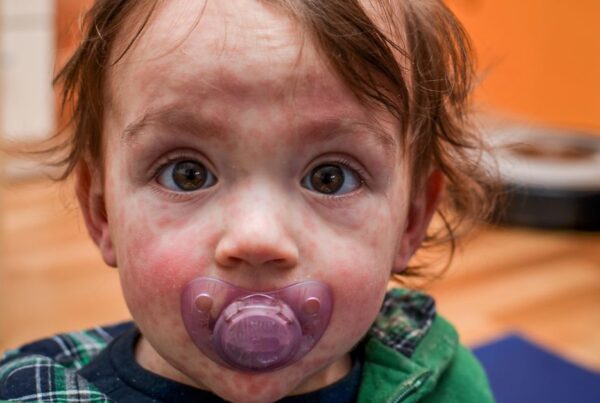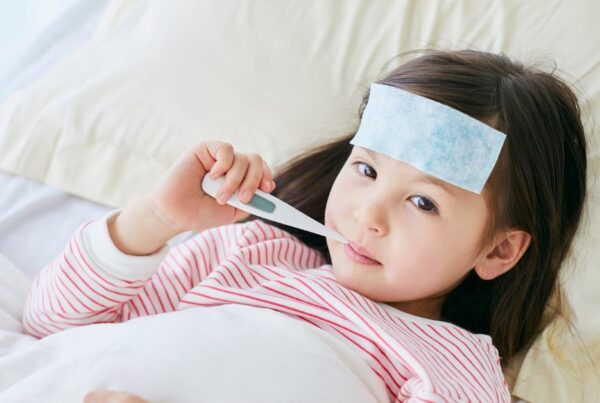Although most parents understand the importance of a good night’s rest, it’s important that kids do, too. According to the American Academy of Pediatrics, about a quarter of children under 5 don’t get adequate sleep (1), and more than half (about 52%) of American children ages 6-17 years old get less than the recommended 9 hours of sleep per night (2). Sleep deprivation is associated with low energy levels, increased risk of sleep apnea, immune system issues, inflammation, and reduced cognition. Overall, sleep deprivation negatively impacts the developing mind & body.
Not to worry! If your child is experiencing sleep difficulties, keep reading to find my list of recommended sleep habits and supplements to ensure your child gets enough sleep to be at their best.
How Much Sleep Does My Child Need?
First, let’s talk about how much sleep your child actually needs. While each child is different, this chart contains a general 24-hour guideline by age, including nighttime sleep & daytime naps (3). If your kiddo isn’t getting the recommended hours of sleep, ensure that your family has good sleep habits. We will discuss below the importance of incorporating sleep habits into your children’s daily routines and supplements that promote sleep.
| Infants (4 to 12 months old) | 12-16 hours |
| Toddlers (1 to 2 years old) | 11-14 hours |
| Children (3 to 5 years old) | 10-13 hours |
| Children (6-12 years) | 9-12 hours |
| Teenagers (13-18 years old) | 8-10 hours |
Habits I Recommend To Improve Sleep
1. Schedule a Regular Bedtime & Waketime
Consistency is key to help children regulate their circadian rhythm or “sleep-wake cycle.” Creating a regular sleep schedule and routine is essential. When establishing a regular bedtime and sleep routine, lead by example. Your children are more likely to stick to a consistent sleep schedule if they see their parents prioritizing healthy sleep habits (4).
Bedtime rituals are a great way to end the day in a manner that emphasizes the importance of winding down and getting ready for bed. Rituals will be specific to each child, but some ideas include putting devices away two hours before bedtime, a warm bath (my favorite is a nice Epsom salt bath), teeth brushing, reading and bonding with your kiddo, picking out an outfit for the next day, listening to calming music, and doing a sleepy-time meditation or gentle stretching.
Morning rituals are less talked about but can be equally powerful. On waking, open the blinds and encourage your kids to get 10-15 minutes of sunshine, which boosts vitamin D, activates “feel good” brain chemicals like dopamine and serotonin, and balances cortisol levels. This also sets their inner clocks so they’re ready to go to sleep in the evening (5). Other morning ritual ideas include exchanging positive affirmations or goal-setting, singing or playing uplifting music, making the bed or completing other chores, and preparing a balanced breakfast.
2. Close The Curtains & Turn Off The Lights
If you’ve been thinking about investing in black-out curtains, this is your sign to do it! While sleeping, any type of light in the room has been shown to suppress the body’s production of melatonin, negatively impact blood pressure & sugar balance, and shorten the way we perceive “night time” by about 90 mins (which is the equivalent to about 1 full REM sleep cycle). A source of light that impacts sleep is the blue light emitted by electronic devices like smartphones, tablets, computers, and television. As mentioned above, implement a screen-time curfew a few hours before bedtime to help your child’s body naturally make melatonin (6).
If your kiddo is afraid of the dark, consider a dim nightlight that has a timer so it automatically shuts off after a certain amount of time or place it as far away as possible from where they sleep. You can try acclimating your child to sleeping in the dark by gradually dimming the light over time until they become comfortable with a darker environment.
3. Stabilize Blood Sugar Before Bedtime
If your child is waking up multiple times in the middle of the night, blood sugar dips could be the culprit. Correcting this requires just a bit of tweaking.
Balanced meals throughout the day help prevent blood sugar spikes and crashes. This means kids are eating a combination of complex carbs, healthy fats, and protein, which all help keep blood sugar stable for longer. Meals that emphasize simple carbs and sugar without the stabilizing influence of complex carbs/fat/protein, especially before bed, can cause blood sugar to rise and fall rapidly.
Offering a light and balanced snack can help stabilize blood sugar levels at night. Kid-approved ideas include: apple slices with nut butter, Greek yogurt and berries, whole grain or seed crackers with cheese. Foods like pumpkin seeds, walnuts, kiwi, tart cherries, and almonds promote melatonin production (7). I always keep a “sleepy time” trail mix on hand for when my kids need a snack before bed.
Getting regular physical activity (at least 30-60 minutes a day) positively affects blood sugar levels, sleep duration, and sleep quality (5). Make sure to avoid any stimulating or vigorous activity right before bedtime as that may have the opposite effect.
4. Incorporate Relaxing Botanicals
I’m a big fan of botanicals because they can be a safe, effective, and gentle tool to help kids settle down and get a good rest. Herbs that help soothe the nervous system and prepare the body for rest include lemon balm, passionflower, chamomile*, catnip, valerian root*, lavender, and California poppy. While each herb has its own unique medicinal properties, all of these work well together to promote relaxation, improve sleep quality, and reduce anxiety or tension.
For kids, these herbs work well as a tea or glycerite. Adults can also take these herbs as tinctures or capsules.
* It is important to note that valerian and chamomile may rarely cause a paradoxical reaction in some people. This means that they will increase restlessness, wakefulness, and anxiety rather than decrease it. It is an obvious reaction and notable after the first dose. Not to worry – the restless effect doesn’t last long!
5. Take Sleep Promoting Supplements As Needed
Besides herbs, certain supplements also promote healthy sleep. You may be familiar with a few of these, but let’s break down a little of the science.
- Magnesium: a mineral that plays a key role in sleep regulation and relaxation by boosting our “relaxing brain chemical,” GABA (9).
- L-Theanine: an amino acid found in certain types of teas and mushrooms that helps to calm the mind & body and is used to improve sleep quality (9).
- Melatonin: our body’s sleep hormone that rises in the evening and prepares us for sleep. Although it helps us to sleep, supplementing with melatonin should only be for short-term use when sleep cycles are disrupted due to travel, time zone differences, jet lag, celebrations, etc. However, in some neurodevelopmental conditions, it may be appropriate to use for a longer time period. Always talk to your doctor before adding this to your child’s routine (10).
These are common ingredients in many sleep promoting supplements and are usually available as a powder, liquid, or chewable. Look for formulas made with kids’ needs and dosage in mind.
Summary
Sleep is essential to good health. When kids aren’t sleeping well it affects everyone’s well-being. Start by developing morning and evening routines to create a consistent sleep and wake schedule. Help children prepare for a good night’s rest by incorporating a bedtime routine that helps them wind down, setting up the room to make it a “lights-out” sleepy time oasis, and ensuring their blood sugar is stabilized through balanced meals and exercise. Relaxing and sleep-promoting herbs or supplements may be a lovely addition to evening routines if kids need extra help settling for the night.
If you’d like to read more about kids’ sleep issues, check out this article: 9 Reasons Your Kids Aren’t Sleeping – Dr. Green Mom.
References:
- Children and Sleep: An Introduction to the Importance of Sleep in Children and How to Help Them Sleep Better. (2023). Sleep Foundation. https://www.sleepfoundation.org/children-and-sleep
- Patricia Franco, et al. (2004). Decreased Arousals Among Healthy Infants After Short-Term Sleep Deprivation. American Academy of Pediatrics. 114 (2): e192–e197. https://doi.org/10.1542/peds.114.2.e192
- Paruthi, S., et al. (2016). Recommended Amount of Sleep for Pediatric Populations: A Consensus Statement of the American Academy of Sleep Medicine. Journal of clinical sleep medicine : JCSM : official publication of the American Academy of Sleep Medicine, 12(6), 785–786. https://doi.org/10.5664/jcsm.5866
- Mindell, J. A., et al. (2015). Bedtime routines for young children: a dose-dependent association with sleep outcomes. Sleep, 38(5), 717–722. https://pubmed.ncbi.nlm.nih.gov/25325483/
- Mead M. N. (2008). Benefits of sunlight: a bright spot for human health. Environmental health perspectives, 116(4), A160–A167. https://doi.org/10.1289/ehp.116-a160
- Gooley, J. J., et al. (2011). Exposure to room light before bedtime suppresses melatonin onset and shortens melatonin duration in humans. The Journal of Clinical Endocrinology and Metabolism, 96(3), E463–E472. https://pubmed.ncbi.nlm.nih.gov/21193540/
- Fonseca, A. P. L. M., et al. (2021). Sleep and health-related physical fitness in children and adolescents: a systematic review. Sleep science (Sao Paulo, Brazil), 14(4), 357–365. https://doi.org/10.5935/1984-0063.20200125
- Meng, X., et al (2017). Dietary Sources and Bioactivities of Melatonin. Nutrients, 9(4), 367. https://doi.org/10.3390/nu9040367
- Dasdelen, et al (2022). A Novel Theanine Complex, Mg-L-Theanine Improves Sleep Quality via Regulating Brain Electrochemical Activity. Frontiers in nutrition, 9, 874254. https://doi.org/10.3389/fnut.2022.874254
- Esposito, S., et al. (2019). Pediatric sleep disturbances and treatment with melatonin. Journal of translational medicine, 17(1), 77. https://doi.org/10.1186/s12967-019-1835-1


